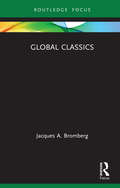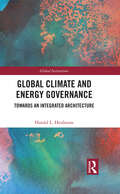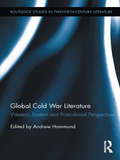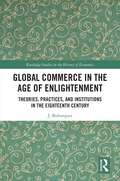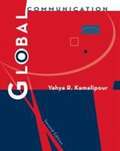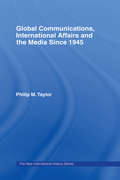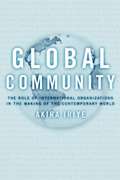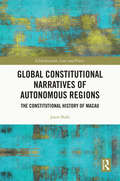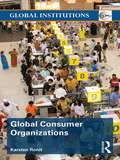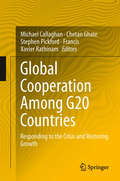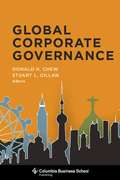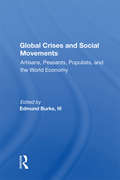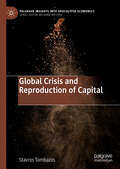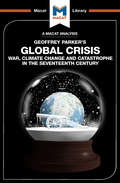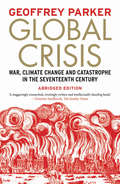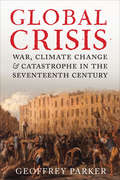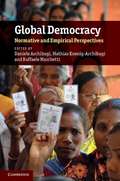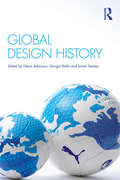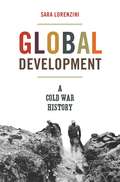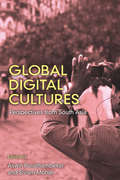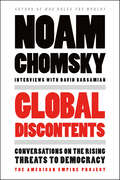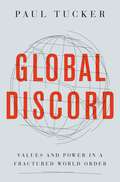- Table View
- List View
Global Classics (Routledge Focus on Classical Studies)
by Jacques A. BrombergWhat makes Classics "global", and what does it mean to study the ancient world "globally"? How can the study of antiquity contribute to our understanding of pressing global issues? Global Classics addresses these questions by pursuing a transdisciplinary dialogue between Classics and Global Studies. Authoritative and engaging, this book provides the first field-wide synthesis of the recent "global turn" in Classics as well as a comprehensive overview of an emerging field in ancient studies. Through focused readings of ancient sources and modern scholarship, the author introduces readers to three key paradigms that are essential to research and teaching in global antiquities: transborder, transhistorical, and transdisciplinary. Global Classics will appeal to educators, students, and scholars interested in the application of globalization theories and paradigms in ancient studies, in globalizing their teaching and research, and in approaches to contemporary global issues through the study of the remote past.
Global Climate and Energy Governance: Towards an Integrated Architecture (Global Institutions)
by Harald L. HeubaumTracing the changing activities of international bureaucracies active in global climate and energy governance, this book provides an in-depth analysis of processes of institutional innovation and governance integration between the two fields. It shows that rather than the consequence of a designed strategy, governance integration – the convergence of approaches and practices among different actors within one or between two or more governance architectures – has come as the result of organizational changes arising from the international bureaucracies’ various efforts to pursue and broaden their mandate in a complex and dynamic global policy environment. Each of the three cases analyzed (the UNFCCC Secretariat, the IEA Secretariat and the World Bank) began their life focused on particular activities that today, following periods of sustained organizational change, make up only part of their operations. Beyond creating greater synergies for cooperation across the governance architectures, improving policies, and mobilizing greater investment to tackle the climate emergency, the book shows governance integration to have contributed to preserving and expanding the role and relevance of all three international bureaucracies.This book will be of interest to students and scholars of global climate and energy governance, climate policy, and international organizations and their bureaucratic arms. Practitioners will find this book useful in thinking about why innovation in governance emerges and how it may be directed.
Global Cold War Literature: Western, Eastern and Postcolonial Perspectives (Routledge Studies in Twentieth-Century Literature #Vol. 3)
by Andrew HammondIn countries worldwide, the Cold War dominated politics, society and culture during the second half of the twentieth century. Global Cold War Literatures offers a unique look at the multiple ways in which writers from Asia, Africa, Europe and North and South America addressed the military conflicts, revolutions, propaganda wars and ideological debates of the era. While including essays on western European and North American literature, the volume views First World writing, not as central to the period, but as part of an international discussion of Cold War realities in which the most interesting contributions often came from marginal or subordinate cultures. To this end, there is an emphasis on the literatures of the Second and Third Worlds, including essays on Latin American poetry, Soviet travel writing, Chinese autobiography, African theatre, North Korean literature, Cuban and eastern European fiction, and Middle Eastern fiction and poetry. With the post-Cold War era still in a condition of emergence, it is essential that we look back to the 1945-89 period to understand the political and cultural forces that shaped the modern world. The volume’s analysis of those forces and its focus on many of the ‘hot spots’ – Afghanistan, Iran, North Korea – that define the contemporary ‘war on terror’, make this an essential resources for those working in Postcolonial, American and English Literatures, as well as in History, Comparative Literature, European Studies and Cultural Studies. Global Cold War Literatures is a suitable companion volume to Hammond's Cold War Literature: Writing the Global Conflict, also available from Routledge.
Global Commerce in the Age of Enlightenment: Theories, Practices, and Institutions in the Eighteenth Century (Routledge Studies in the History of Economics)
by Jesús BohorquezCombining contextual, institutional and global perspectives, this book evaluates the impact of international trade on eighteenth-century economic thought. It meticulously delineates how economic ideas and institutions flowed between North and South Europe and across the Indian and Atlantic Oceans during the Age of Enlightenment. Global Commerce in the Age of Enlightenment carefully explores contemporary debates about economic institutions, which were a crucial element in the race for controlling international trade. Eighteenth-century thinkers devoted much attention to the relative merits of existing institutions, such as free ports, grasped the dangers of economic dependence, and appraised emerging conceptions of property rights. The author draws on an impressive range of sources, including pamphlets and travel accounts, and work from lesser-known figures such as Pierre Poivre and Ange Goudar. This volume will be valuable reading for advanced students and researchers of the history of economic thought, economic history, political economy, the history of ideas and global history.
Global Communication
by Yahya R. KamalipourDevelop an understanding of significant economic, cultural, legal, social, and political issues in the exciting field of global communication with Diggs-Brown's GLOBAL COMMUNICATION presents. From history and theories to future trends, this indispensable and highly informative volume brings together illuminating writings and diverse perspectives by prominent scholars in mass media, journalism, and international studies.
Global Communications, International Affairs and the Media Since 1945 (The New International History)
by Philip TaylorIn Global Communications, International Affairs and the Media since 1945 , Philip M. Taylor traces the increased involvement of the media in issues of peace and especially war from the nineteenth century to the present day. He analyzes the nature, role and impact of communications within the international arena since 1945 and how communications interacts with foreign policy in practice rather than in theory. Using studies which include the Gul War and Vietnam, Taylor details the contemporary problems reporting while at the same time providing a comprehensive historical context.
Global Community: The Role of International Organizations in the Making of the Contemporary World
by Akira IriyeExamines the concept of "global community" by looking at the emergence, growth, and activities of international organizations--both governmental and nongovernmental--from the end of the nineteenth century to today.
Global Connections: Politics, Exchange, and Social Life in World History
by Charles Tilly Peter C. Perdue John Coatsworth Juan Cole Michael P. Hanagan Peter C. Perdue Charles Tilly Louise Tilly John Coatsworth Juan Cole Michael P. HanaganThe first textbook to present world history via social history, drawing on social science methods and research. This interdisciplinary, comprehensive and comparative textbook is authored by distinguished scholars and experienced teachers, and offers expert scholarship on global history that is ideal for undergraduate students. Volume 1 takes us from the origin of hominids to ancient civilizations, the rise of empires, and the Middle Ages. The book pays particular attention to the ways in which ordinary people lived through the great changes of their times, and how everyday experience connects to great political events and the commercial exchanges of an interconnected world. With 65 maps, 45 illustrations, timelines, boxes, and primary source extracts, the book moves students easily from particular historical incidents to broader perspectives, enabling them to use historical material and social science methodologies to analyze the events of the past, present and future.
Global Connections: Politics, Exchange, and Social Life in World History
by Charles Tilly Peter C. Perdue John Coatsworth Juan Cole Michael P. Hanagan Peter C. Perdue Charles Tilly Louise Tilly John Coatsworth Juan Cole Michael P. HanaganThe first textbook to present world history via social history, drawing on social science methods and research. This interdisciplinary, comprehensive and comparative textbook is authored by distinguished scholars and experienced teachers, and offers expert scholarship on global history that is ideal for undergraduate students. Volume 1 takes us from the origin of hominids to ancient civilizations, the rise of empires, and the Middle Ages. The book pays particular attention to the ways in which ordinary people lived through the great changes of their times, and how everyday experience connects to great political events and the commercial exchanges of an interconnected world. With 65 maps, 45 illustrations, timelines, boxes, and primary source extracts, the book moves students easily from particular historical incidents to broader perspectives, enabling them to use historical material and social science methodologies to analyze the events of the past, present and future.
Global Constitutional Narratives of Autonomous Regions: The Constitutional History of Macau (Globalization: Law and Policy)
by Jason BuhiWith international attention focused on Hong Kong, many forget that Macau also exists in a delicate `one country, two systems’ (OCTS) balance with mainland China. This book provides insights into the circumstances surrounding the less-understood half of China’s OCTS policy, including the stagnation of representational government, and the location of any Macau characteristics in the Macau Basic Law. Despite being Hong Kong’s sister `Special Administrative Region’ (SAR) within the People’s Republic of China, Macau’s unique constitutional development under Portuguese and Chinese administration remains under-appreciated despite its potential contributions to local, national, and international constitutional discourse. Utilizing a multi-disciplinary approach including doctrinal, historical, and comparative methodologies, this work fills that gap. The research blends Portuguese, Chinese, and foreign-language sources in order to reconstruct a balanced constitutional narrative. The book focuses on a consequential effect of globalization – that is, the assimilation of a longstanding and unique constitutional order by a new hegemonic sovereign – including processes for internationalization as China opened up, legal harmonization of two distinct legal and socioeconomic orders, juridification of local affairs with the establishment of a new local court system in preparation for handover to the Chinese regime, and democratization (or the lack thereof) among the various communities comprising the Macanese polity before and since. Focusing on Macau’s unique development at the crux of European and Chinese empires, and the role it plays as a mirror for Chinese intentions vis-a-vis Hong Kong today, the book will be of interest to those working in Constitutional Law, Politics and History.
Global Consumer Organizations (Global Institutions)
by Karsten RonitAs corporate activity continues to expand in line with the continued globalization of the economy there is an increasing demand for establishing rules to regulate the trans-boundary activities of firms and their many and complex relations with consumers. Until now, sources of knowledge in this field have been scattered and unsystematic and this volume fills a key gap in current literature, providing a concise and accessible introduction to the role of global consumer organizations. The book: Provides an historical overview that traces the early attempts made before WWII to formulate elements of global consumer policy, highlighting key issues and initiatives up until the 1980s. Outlines the groups of organizations that are responsible for dealing with consumer issues in areas such as trade and development, socio-economics and the environment, including the Organisation for Economic Co-operation and Development, World Trade Organization, International Monetary Fund, United Nations Conference on Trade and Development, and World Bank. Analyses the group of special intergovernmental organizations that address the problems of specific consumer segments, industries and service-providers, including the World Health Organization, International Telecommunication Union and World Tourism Organization. Evaluates both current and future challenges and dilemmas facing consumer organizations, including addressing the continued issues of coordination between them. Providing a much-needed overview of this key area in international organization, Global Consumer Organizations will be of interest to students and scholars in a range of areas, including international political economy, consumer behaviour, international organizations, economic policy and consumer behaviour.
Global Cooperation Among G20 Countries
by Stephen Pickford Michael Callaghan Chetan Ghate Francis Xavier RathinamAt the outbreak of the global financial crisis, 2008, the G20 was widely acknowledged as helping prevent an even more serious decline in the global economy. It helped to calm the panic in financial markets and articulate a set of possible policy options to restore global stability and growth. However, as the dual-track recovery set in, policy options for advanced economies and EMEs diverged. Within this context, this book will explore the scope for cooperation amongst the G20 and the diverging challenges and the intricate interconnectedness of policy options between advanced economies and the EMEs within the G20.
Global Corporate Governance (Columbia Business School Publishing Ser.)
by Stuart L Gillan Donald H. Chew Eds.Effective corporate governance, or the set of controls and incentives that drive top management, originates both outside and inside the firm and assures investors who hope to commit their capital. Essential when buying stocks in one's own country, effective corporate governance is even more important abroad, where information can be less reliable and investor influence (or protection) more limited. In this collection of articles from the Journal of Applied Corporate Finance, more than thirty leading scholars and practitioners discuss the possibilities and limitations of global corporate finance and governance systems, whether in Europe and North America or in the emerging markets of Israel, India, Korea, and South Africa. Essays discuss the political roots of American corporate finance; the structural and financial variations between international corporations; control premiums and the effectiveness of corporate governance systems; debt, folklore, and cross-country differences in financial structures; the driving forces behind the East Asian Financial Crisis of 1997; corporate ownership and control in India, Germany, France, and the United Kingdom; financial and economic lessons of Italy's privatization program; changes in Korean corporate governance; sovereign wealth funds; and the new organization of Canadian business trusts. A special roundtable discussion addresses shareholder activism in the U.K.
Global Crises And Social Movements: Artisans, Peasants, Populists, And The World Economy
by Edmund BurkeTraditionally, scholars have traced the origins and characteristics of social movements to purely local and national determinants. Until recently, the global dimension of such movements has been relatively neglected. This book takes the innovative step of linking social movements to international political and economic crises, identifying the general features of industrial and developing societies that predispose them toward social movements of particular kinds. The book consists of three parts. views the origins of the European working-class collective movement of 1848 from a variety of perspectives. reexamines the debate on the moral economy of the peasant in terms of "peasant nonrevolt" and global political economy. considers the emergence of fascist and populist movements in Western Europe and East Asia in their intersocietal dimensions. Each of the cases has been selected for its strategic contribution to an understanding of the occurrence of social movements in relation to large-scale societal crises. Collectively, the essays underscore the methodological utility of situating such movements in a global context.
Global Crisis and Reproduction of Capital (Palgrave Insights into Apocalypse Economics)
by Stavros TombazosThis Palgrave Pivot uses Marxian economic categories and analysis to explore the deeper causes of the 2008 global economic crisis, what the crisis represents for capitalism, and why fiscal and monetary policies pursued in its wake have failed to rejuvenate economies.With an innovative interpretation of the crisis and a focus on 'toxic capital’ – a sub-division of Karl Marx’s concept of fictitious capital – Tombazos examines the specificities of economic reproduction under neoliberalism and financialisation.
Global Crisis: War, Climate Change and Catastrophe in the Seventeenth Century
by Ian JacksonFew historians can claim to have undertaken historical analysis on as grand a scale as Geoffrey Parker in his 2013 work Global Crisis: War, Climate Change and Catastrophe in the Seventeenth Century. It is a doorstop of a book that surveys the ‘general crisis of the 17th century,’ shows that it was experienced practically throughout the world, and was not merely a European phenomenon, and links it to the impact of climate change in the form of the advent of a cold period known as the ‘Little Ice Age.’ Parker’s triumph is made possible by the deployment of formidable critical thinking skills – reasoning, to construct an engaging overall argument from very disparate material, and analysis, to re-examine and understand the plethora of complex secondary sources on which his book is built. In critical thinking, analysis is all about understanding the features and structures of argument: how given reasons lead to conclusions, and what kinds of implicit reasons and assumptions are being used. Historical analysis applies the same skills to the fabric of history, asking how given chains of events occur, how different reasons and factors interact, and so on. Parker, though, takes things further than most in his quest to understand the meaning of a century’s-worth of turbulence spread across the whole globe. Beginning by breaking down the evidence for significant climatic cooling in the 17th-century (due to decreased solar activity), he moves on to detailed study of the effects the cooling had on societies and regimes across the world. From this detailed spadework, he constructs a persuasive argument that accounts for the different ways in which the effects of climate change played out across the century – an argument with profound implications for a future likely to see serious climate change of its own.
Global Crisis: War, Climate Change and Catastrophe in the Seventeenth Century - Abridged Ed.
by Geoffrey ParkerAn accessible synthesis of the prescient best seller exploring seventeenth-century catastrophe and the impact of climate change First published in 2013, Geoffrey Parker’s prize-winning best seller Global Crisis analyzes the unprecedented calamities—revolutions, droughts, famines, invasions, wars, and regicides—that befell the mid-seventeenth-century world and wiped out as much as one-third of the global population, and reveals climate change to be the root cause. Examining firsthand accounts of the crises and scrutinizing the prevailing weather patterns during the 1640s and 1650s—longer and harsher winters, and cooler and wetter summers—Parker reveals evidence of disrupted growing seasons causing malnutrition, disease, a higher death toll, and fewer births. This new abridged edition distills the original book’s prodigious research for a broader audience while retaining and indeed emphasizing Parker’s extraordinary historical achievement: his dazzling demonstration of the link between climate change and worldwide catastrophe 350 years ago. Yet, the contemporary implications of his study are equally important: are we prepared today for the catastrophes that climate change could bring tomorrow? At half the original length, this user-friendly abridgment is ideal for students and general readers seeking a rapid handle on the key issues.
Global Crisis: War, Climate Change, & Catastrophe in the Seventeenth Century
by Geoffrey ParkerThe acclaimed historian demonstrates a link between climate change and social unrest across the globe during the mid-17th century.Revolutions, droughts, famines, invasions, wars, regicides, government collapses—the calamities of the mid-seventeenth century were unprecedented in both frequency and severity. The effects of what historians call the "General Crisis" extended from England to Japan and from the Russian Empire to sub-Saharan Africa and the Americas.In this meticulously researched volume, historian Geoffrey Parker presents the firsthand testimony of men and women who experienced the many political, economic, and social crises that occurred between 1618 to the late 1680s. He also incorporates the scientific evidence of climate change during this period into the narrative, offering a strikingly new understanding of the General Crisis. Changes in weather patterns, especially longer winters and cooler and wetter summers, disrupted growing seasons and destroyed harvests. This in turn brought hunger, malnutrition, and disease; and as material conditions worsened, wars, rebellions, and revolutions rocked the world.
Global Dance Cultures in the 1970s and 1980s: Disco Heterotopias (Palgrave Studies in the History of Subcultures and Popular Music)
by Flora Pitrolo Marko ZubakThis book explores some of disco’s other lives which thrived between the 1970s and the 1980s, from oil-boom Nigeria to socialist Czechoslovakia, from post-colonial India to war-torn Lebanon. It charts the translation of disco as a cultural form into musical, geo-political, ideological and sociological landscapes that fall outside of its original conditions of production and reception, capturing the variety of scenes, contexts and reasons for which disco took on diverse dimensions in its global journey. With its deep repercussions in visual culture, gender politics, and successive forms of popular music, art, fashion and style, disco as a musical genre and dance culture is exemplary of how a subversive, marginal scene – that of queer and Black New York undergrounds in the early 1970s – turned into a mainstream cultural industry. As it exploded, atomised and travelled, disco served a number of different agendas; its aesthetic rootedness in ideas of pleasure, transgression and escapism and its formal malleability, constructed around a four-on-the-floor beat, allowed it to permeate a variety of local scenes for whom the meaning of disco shifted, sometimes in unexpected and radical ways.
Global Democracy: Normative and Empirical Perspectives
by Daniele Archibugi Mathias Koenig-Archibugi Raffaele MarchettiDemocracy is increasingly seen as the only legitimate form of government, but few people would regard international relations as governed according to democratic principles. Can this lack of global democracy be justified? Which models of global politics should contemporary democrats endorse and which should they reject? What are the most promising pathways to global democratic change? To what extent does the extension of democracy from the national to the international level require a radical rethinking of what democratic institutions should be? This book answers these questions by providing a sustained dialogue between scholars of political theory, international law and empirical social science. By presenting a broad range of views by prominent scholars, it offers an in-depth analysis of one of the key challenges of our century: globalizing democracy and democratizing globalization.
Global Design History
by Giorgio Riello Glenn Adamson Sarah TeasleyGlobalism is often discussed using abstract terms, such as ‘networks’ or ‘flows’ and usually in relation to recent history. Global Design History moves us past this limited view of globalism, broadening our sense of this key term in history and theory. Individual chapters focus our attention on objects, and the stories they can tell us about cultural interactions on a global scale. They place these concrete things into contexts, such as trade, empire, mediation, and various forms of design practice. Among the varied topics included are: the global underpinnings of Renaissance material culture the trade of Indian cottons in the eighteenth-century the Japanese tea ceremony as a case of ‘import substitution’ German design in the context of empire handcrafted modernist furniture in Turkey Australian fashions employing ‘ethnic’ motifs an experimental UK-Ghanaian design partnership Chinese social networking websites the international circulation of contemporary architects. Featuring work from leading design historians, each chapter is paired with a ‘response’, designed to expand the discussion and test the methodologies on offer. An extensive bibliography and resource guide will also aid further research, providing students with a user friendly model for approaches to global design. Global Design History will be useful for upper-level undergraduate and postgraduate students, academics and researchers in design history and art history, and related subjects such as anthropology, craft studies and cultural geography.
Global Development: A Cold War History (America in the World #38)
by Sara LorenziniIn the Cold War, "development" was a catchphrase that came to signify progress, modernity, and economic growth. Development aid was closely aligned with the security concerns of the great powers, for whom infrastructure and development projects were ideological tools for conquering hearts and minds around the globe, from Europe and Africa to Asia and Latin America. In this sweeping and incisive book, Sara Lorenzini provides a global history of development, drawing on a wealth of archival evidence to offer a panoramic and multifaceted portrait of a Cold War phenomenon that transformed the modern world.Taking readers from the aftermath of the Second World War to the tearing down of the Berlin Wall, Lorenzini shows how development projects altered local realities, transnational interactions, and even ideas about development itself. She shines new light on the international organizations behind these projects—examining their strategies and priorities and assessing the actual results on the ground—and she also gives voice to the recipients of development aid. Lorenzini shows how the Cold War shaped the global ambitions of development on both sides of the Iron Curtain, and how international organizations promoted an unrealistically harmonious vision of development that did not reflect local and international differences.An unparalleled journey into the political, intellectual, and economic history of the twentieth century, this book presents a global perspective on Cold War development, demonstrating how its impacts are still being felt today.
Global Digital Cultures: Perspectives from South Asia
by Aswin Punathambekar Sriram MohanDigital media histories are part of a global network, and South Asia is a key nexus in shaping the trajectory of digital media in the twenty-first century. Digital platforms like Facebook, WhatsApp, and others are deeply embedded in the daily lives of millions of people around the world, shaping how people engage with others as kin, as citizens, and as consumers. Moving away from Anglo-American and strictly national frameworks, the essays in this book explore the intersections of local, national, regional, and global forces that shape contemporary digital culture(s) in regions like South Asia: the rise of digital and mobile media technologies, the ongoing transformation of established media industries, and emergent forms of digital media practice and use that are reconfiguring sociocultural, political, and economic terrains across the Indian subcontinent. From massive state-driven digital identity projects and YouTube censorship to Tinder and dating culture, from Twitter and primetime television to Facebook and political rumors, Global Digital Cultures focuses on enduring concerns of representation, identity, and power while grappling with algorithmic curation and data-driven processes of production, circulation, and consumption.
Global Discontents: Conversations on the Rising Threats to Democracy (The American Empire Project)
by Noam Chomsky David BarsamianIn this compelling set of interviews, the intellectual discusses contemporary threats to democracy, from economic inequality to the Trump presidency.In wide-ranging discussions with David Barsamian, his longtime interlocutor, Noam Chomsky asks us to consider “the world we are leaving to our grandchildren”: one imperiled by climate change and the growing potential for nuclear war. If the current system is incapable of dealing with these threats, he argues, it’s up to us to radically change it.The twelve interviews in Global Discontents examine the recent global developments: the rise of ISIS, the reach of state surveillance, growing anger over economic inequality, conflicts in the Middle East, and the presidency of Donald Trump. In personal reflections on his Philadelphia childhood, Chomsky also describes his own intellectual journey and the development of his uncompromising stance as America’s premier dissident intellectual.“Well-informed salvos to please or enrage, depending on one’s politics.” —Kirkus Reviews
Global Discord: Values and Power in a Fractured World Order
by Paul TuckerHow to sustain an international system of cooperation in the midst of geopolitical struggleCan the international economic and legal system survive today’s fractured geopolitics? Democracies are facing a drawn-out contest with authoritarian states that is entangling much of public policy with global security issues. In Global Discord, Paul Tucker lays out principles for a sustainable system of international cooperation, showing how democracies can deal with China and other illiberal states without sacrificing their deepest political values. Drawing on three decades as a central banker and regulator, Tucker applies these principles to the international monetary order, including the role of the U.S. dollar, trade and investment regimes, and the financial system.Combining history, economics, and political and legal philosophy, Tucker offers a new account of international relations. Rejecting intellectual traditions that go back to Hobbes, Kant, and Grotius, and deploying instead ideas from David Hume, Bernard Williams, and modern mechanism-design economists, Tucker describes a new kind of political realism that emphasizes power and interests without sidelining morality. Incentives must be aligned with values if institutions are to endure. The connecting tissue for a system of international cooperation, he writes, should be legitimacy, creating a world of concentric circles in which we cooperate more with those with whom we share the most and whom we fear the least.
